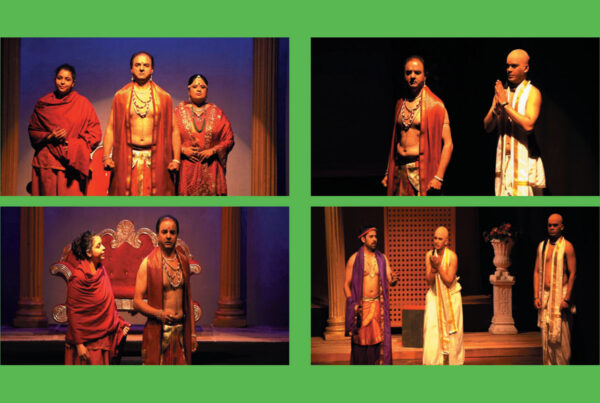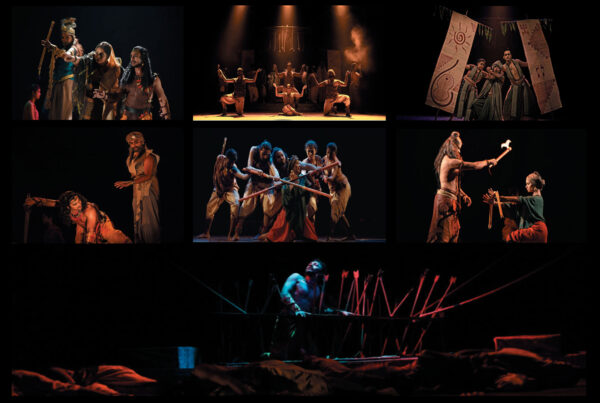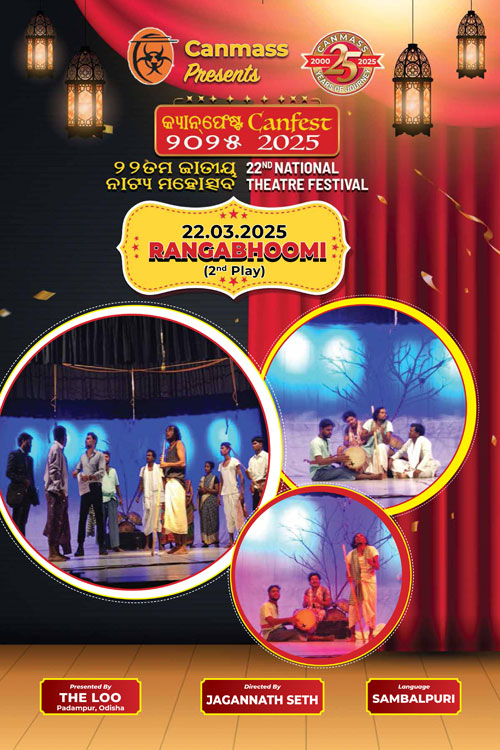
RANGABHOOMI
22.03.2025 (Thursday)
GROUP: The Loo, Padampur, Odisha
DIRECTOR: Jagannath Seth
LANGUAGE: Sambalpuri
DURATION: 01:14 mins
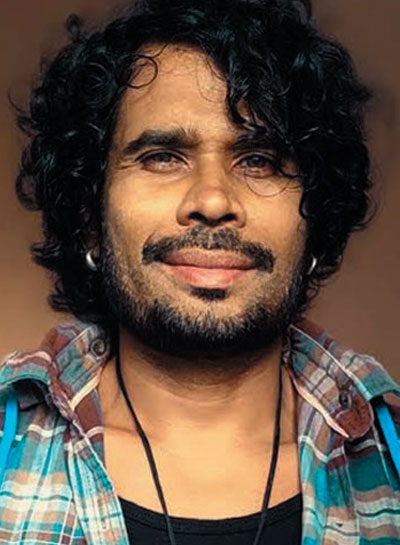
The Director
Jagannath Seth is an Odisha-born Bollywood actor and theatre activist who has been actively working in the industry since 1998. A graduate of the prestigious National School of Drama (NSD), Jagannath spent seven years in the NSD repertory, where he portrayed a wide array of characters in around 80 play sunder renowned directors across India. His deep commitment to the craft of acting and storytelling has earned him a respected name in the theatre world. Now based in Mumbai, Jagannath is a busy creative artist who has successfully transitioned to film and television, featuring in 10 films and 24 commercial advertisements. His body of work showcases his versatility and range as a performer, while his passion for theatre continues to shine through his ongoing work as a director. With over two decades of experience, Jagannath brings a rich understanding of the stage and screen to every project he undertakes.
The Group
The Loo, Padampur, established in 1993, stands as a pioneering cultural organization committed to the preservation and evolution of art and theatre in Western Odisha. Named after the forgotten letter“&” of the Devnagri script, The Loo has become avital force in revitalizing Sambalpuri/Kosli language theatre, creating a unique blend of local and global narratives. Rooted in the folkloristic richness of the Budasambar region, the group crafts productions that are both deeply local and universally resonant(“GLOCAL”). Their plays, such as Kuili Kuili Kie Raja, Garabandha, Paaruti, and Asur, are powerful explorations of the marginalized voices, offering bold and nuanced social commentary.
The group’s repertoire is both diverse and profound, with dramatic adaptations of literary classics by Kalidas, Sarala Das, Tolstoy, Premchand, Manoj Das, and Hrushikesh Panda. These works are reimagined to reflect contemporary social dynamics, providing fresh, insightful perspectives. The Loo has been instrumental in not only preserving local culture but also expanding its reach to global audiences, embodying the perfect harmony of tradition and innovation.
Under the guidance of Jagannath Seth, a National School of Drama alumnus and celebrated actor director, the group’s young artists under gorigorous production oriented workshops. These annual sessions offer hands-on training, refining their craft while maintaining the integrity and emotional depth of the performances. Through its dedication to storytelling, cultural preservation, and innovation, The Loo, Padampur, has solidified its place as a trailblazer in Indian theatre, making profound contributions to both regional and national cultural landscapes.
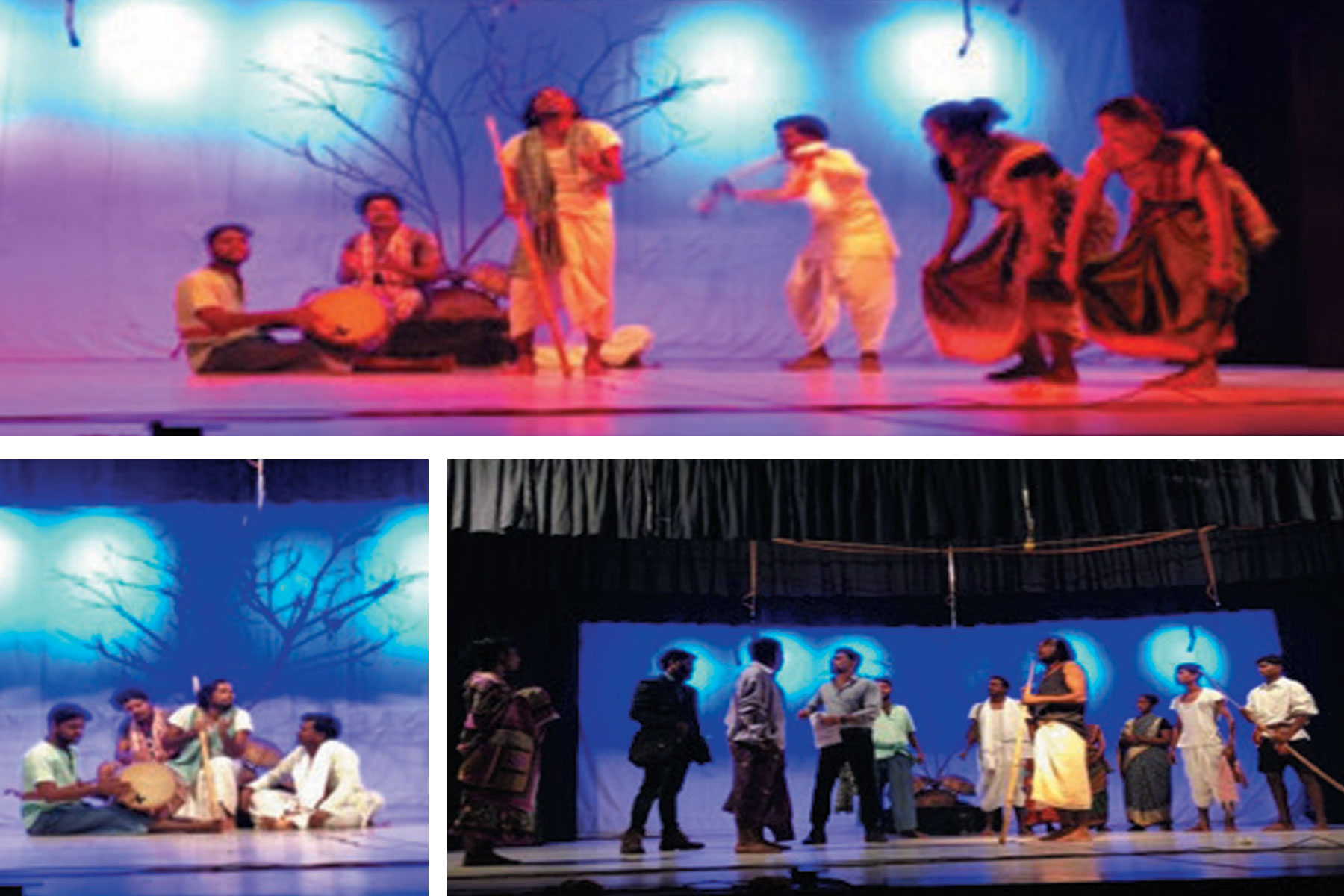
The Play
This play is a profound exploration set in colonial India, centering on Soordas, a blind beggar who request for justice and recognition for his ancestrall and embodies a larger struggle against exploitation and resistance. Though physically blind, Soordas possesses a remarkable ability to perceive the true essence of people and nature, seeing a vibrant spectrum of emotions and nuances that others often miss. His deep empathy and expansive heart allow him to connect with the world on a profound level. The story reveals Soordas’s confrontation with powerful figures who represent conflicting forces—those driving progress and those clinging to traditional values. This conflict symbolizes the broader societal tensions between personal ambitions and collective expectations. The play explores themes of moral integrity, justice, and the complexities of human desires. It highlights how societal pressures and individual values intersect, offering a moving commentary on resilience, the nature of true vision, and the pursuit of dignity amid change.
Director’s Note
“In directing this play, I have integrated Kabir’s philosophy to enrich the portrayal of Soordas and his unique perspective on life. Soordas, a blind beggar, embodies a profound understanding of human relationships and the nature of perception. Through this lens, I have symbolically used body parts to highlight deeper truths. The eyes, often seen as sources of greed, paradoxically reveal profound truths, while ears, which can be conduits for deceit, are contrasted with Soordas’s ability to hear with his heart.
This thematic exploration is captured in the symbolic distance between truth and deception, represented by the mere four inches between the eyes and ears. For Soordas, the physical obstacles like mountains symbolize essential virtues such as Daya (compassion), Kshama (forgiveness), Karuna(empathy), and Kripa (grace). These are perceptible to him despite his blindness and are central to his worldview. In contrast, others perceive their surroundings as mere walls—simple barriers in their homes—representing societal vices like Irshya (envy), Ghrina (hatred), Ahankar (pride), and Lobh (greed). This juxtaposition underscores the differing philosophies between Soordas’s idealistic vision and the more cynical perspectives of others. The play thus offers a contemplative examination of how personal and societal values shape our understanding of truth and morality.”
Kulvinder Bakshish SinghDirector of RANGABHOOMI (Drama)
Credits
Sure – Jagannath Seth
Kalu-Debesh Kumar Seth
Bhura-Rukmana Seth
Lakshmi- Dolly sagar
Sudhir -Sudhir Suna
Patita – Manas Ranjan sahu
Village character:
Gajanan nag
Subrat Pattanayk
Bikash Dansena
Uddhaba Ghibela
Rashmi Biswal
Tikeswari Suna
Shruti Rekha sahu
Dibya Kishor Bariha
Pritesh Ratha
Jivan Raam panda
Kesha Ranjan Pradhan
Rashmi mayee Seth

